Moving to Ecuador
Last activity 23 September 2015 by OsageArcher
7102 Views
43 replies
Subscribe to the topic
Post new topic
I plan on living in Guayaquil while I decide where to live permanently. Do to having COPD I will be limited to a lower elevation. In the USA me breathing difficulties begin about 3,500' yet in Mexico I breath well at 5,000' to almost 7,000'. I attribute the difference to general air quality. From Guayaquil I will travel and select a permanent location.
Do you presently living in Ecuador have any tips for me. I do speak Español the Mexican dialect so I may need time to understand the dialect spoken in Ecuador. I enjoy speaking Español and am sure it will be helpful.
Tips please.
Regards,
Keltic Tom
Keltic Tom wrote:I plan on living in Guayaquil while I decide where to live permanently. Due to having COPD I will be limited to a lower elevation. In the USA me breathing difficulties begin about 3,500' yet in Mexico I breathe well at 5,000' to almost 7,000'. I attribute the difference to general air quality.
Nothing personal, Tom, but this plan is severely flawed.
Given your health, it makes no sense to base in Guayaquil, a crowded, polluted megalopolis an hour and a half from the ocean breeses.
A city where, statistics show, an average of 50 persons per month have been victims of "express kidnapings," typically night-time abductions where the mark is forced to withdraw cash from an ATM before being released. That's 50 in GYE compared to 1 or 2 monthly in the capital, Quito. (Source: the Latin American crime-watch publication Dialogo-Americas, statistics for Jan. 1- Nov. 11, 2012, during which time 510 express kidnappings were reported in Guayaquil.)
Think about having a base in one of the Pacific Ocean coastal towns, providing you the low altitude you need and a cooler, more livable environment thanks to the moderating wind currents. You're not going to end up in GYE regardless.
Good luck in Ecuador.
cccmedia, Quito
Dear cccmedia,
Thanks for the tip. The last thing I need is to be kidnapped. At age 72 I would be an easy mark. I am looking for peace and smiling faces not problems. My plans for years were to retire in México but do to the violence caused by Zeta and others the smiles have vanished and the once very friendly Mexicanos are all paranoid.
Where in the coastal hills would you suggest which would allow me to use as a base camp to explore the 2,500' to 3,500' region.
Although I do not like to generalize I would like your opinion of the general population vs. the indigenous Ecuadorian Indian. Which group is more peaceful, more law abiding and friendlier? Which group would make the best neighbors?
Warm regards,
Keltic Tom
Keltic Tom wrote:cccmedia, where in the coastal hills would you suggest which would allow me to use as a base camp to explore the 2,500' to 3,500' region.
Tom, I'm personally more of a highlands guy, living near the Basilica that overlooks El Centro in Quito. I am unfamiliar with the term "coastal hills" in Ecuador.
Let's open this up to our coastal experts.
Keltic Tom wrote:cccmedia...I am looking for peace and smiling faces not problems....Although I do not like to generalize I would like your opinion of the general population vs. the indigenous Ecuadorian Indian. Which group is more peaceful, more law abiding and friendlier? Which group would make the best neighbors?
I would go with your first concept, not to "generalise."
Just come down to EC, get familiar with some places at the altitudes with which you are comfortable, and I think you'll develop a good idea about where to live.
At 72 and with the breathing issue, you're going to want to keep in mind access to hospitals and health care. Some of the towns may be too distant from a hospital or lack adequate transport services in case of an emergency. Others may have solved this problem one way or another.
If you explore around this expat-blog you may find that others have already written about the coastal towns. I've read enough good things about Salinas and Bahia de Caraques that I might book a room for the first two nights in one of those towns if I were you, and then work around from there.
Manta was the subject of a low-tech video posted on expat-blog a few days ago. It's perhaps the largest Ecuadorian city on the coast but its central area appeared unappealing, to say the least, in the video.
Dear cccmedia,
Looking at the Western foot hills to Andes 2,500' to 3,500' what might you suggest? I would like a central point from which to explore. I will be traveling light ... a room with kitchen and bath privileges will do. When I have found my new home I will have my house hold goods shipped. One move will be enough.
Thanking-you in advance.
Warm regards,
Tom
Keltic Tom wrote:cccmedia,
Looking at the Western foot hills to Andes 2,500' to 3,500' what might you suggest? I would like a central point from which to explore. I will be traveling light ... a room with kitchen and bath privileges will do. When I have found my new home I will have my house hold goods shipped. One move will be enough.
I'm at 9,500' in Quito and can't really make out those foothills.
As you will be traveling light, consider the alternate concept of not being tethered to a central point from which to explore. Instead, get a starting point and spend enough time in any one place to (1) explore it to determine if it might be for you (2) figure out where you would be headed next (3) arrange transportation to the next place. Traveling light and not leaving stuff behind at a central location means you are open to the forces of light to
send serendipity your way.
Why not fly into Guayaquil, and then head from there to La Libertad/Salinas area. Others on here would know much more about Salinas than I, but think it probably has pretty good infrastructure, and amenities that you need to get your feet wet. Might not be the place you ultimately decide on, but given the fact you speak spanish there should be plenty of expats, and Ecuadorians in that area you can speak with who would have good knowledge of plenty of different places you might like. Would think Salinas would be a safe choice to get your bearings, talk to people, and see what's what, and who knows it might even be the place you want to settle.
"Coastal Hills" - Most Pacific beaches have rolling hills (Coastal Hills) leading to the Sierra Mountains. Much of California is beach, Coastal Hills 1,500' to 2,500', a valley, a second N/S mountain range up to 5K' or 6K', a wide valley and near its eastern boarder the Sierra Madre to 14K+'.
I would think there is rolling hills between the sea level and the top of the Andes.
Keltic Tom wrote:"Coastal Hills" - Most Pacific beaches have rolling hills (Coastal Hills) leading to the Sierra Mountains. Much of California is beach, Coastal Hills 1,500' to 2,500', a valley, a second N/S mountain range up to 5K' or 6K', a wide valley and near its eastern boarder the Sierra Madre to 14K+'.
I would think there is rolling hills between the sea level and the top of the Andes.
But what if you're wrong? What if Ecuador does not share common topography with California?
What if coastal Ecuador is predominately low elevation desert and then rises up quite sharply to the Andes?
It is possible.
Keltic Tom wrote:Most Pacific beaches have rolling hills (Coastal Hills) leading to the Sierra Mountains. Much of California is beach, Coastal Hills 1,500' to 2,500', a valley, a second N/S mountain range up to 5K' or 6K', a wide valley and near its eastern boarder the Sierra Madre to 14K+'.
I would think there is rolling hills between the sea level and the top of the Andes.
More power to you if you can thread this needle, Tom.
As you move inland from the Pacific Ocean, the less likely it is that 2K of altitude will counteract the intensity and heat (on clearer days) of the Equatorial sun. You lose the effect of the direct ocean breeses that most Expats need or prefer when outside the highlands.
When you get to EC, you may be impressed how different "the Land of the Sun" is from California and Mexico.
Consider renting a place right at the cooler shore with the best available access to emergency medical care.
To cccmedia and gardener1 ... I am beginning to get the picture. Lost of sun year-round, cool beaches 6-7 months a year but the finest, more stable weather starts at 5K' ...? Am I getting close?
What is between 2,500' and 4,500'? No body there? Is it undeveloped? Is it cliff like for thousands of feet? Draw me a verbal picture if you will.
How long from landing with a non-tourist visa (on average) until a residency visa and permission to ship house hold goods? Landing in Quito ... should I get the ball rolling there? If so how many days might it take. My spoken Español is pretty good and far better with the educated city folks than with the dialects spoken in the country side.
The following is a joke of mine based on a decade in Kuwait followed by 14 years in México. A Kuwaiti and a Mexican are talking in English but occasionally use an Arabic or Spanish word. At a point the Kuwaiti asks the Mexican about the word "mañana". The Mexican rubs his chin, thinks a moment and replies, "Well it actually means 'tomorrow' but in México it may mean a few days, maybe next week or maybe never." The Kuwaiti nods his understanding and the conversation until the Kuwaiti uses the work "bok-ra" once again and the Mexican inquires about the word. The Kuwaiti pauses for a moment then responds .... "Well it is similar to you 'mañana' and does means 'tomorrow' but does not imply such urgency."
I am well versed in the meaning of both.
Regards,
Tom
cccmedia ... a few questions about camera film and development in Ecuador. Are 35mm canisters (actually 135 film) and rolls of 120 film sold in photo shops and are both developed in country?
If not is importation easy and at a reasonable cost. Here in the USA I purchase my film from B&H in NY City do to price, selection and freshness. What will be my options be in Ecuador?
Regards,
Tom
Keltic Tom wrote:To cccmedia and gardener1 ...
How long from landing with a non-tourist visa until a residency visa and permission to ship house hold goods? Landing in Quito ... should I get the ball rolling there?
Residency visa processing -- figure on a minimum of six weeks, Tom, and that minimum is possible only if your U.S. paperwork is impeccable. My investment visa took almost six months. I had to get an apostille paper sent down from the U.S. and the U.S. State Department (unaccountably) refused to provide the apostille or certification on the first request, causing a long delay due to overseas mail times.
However, once you submit your visa application with supporting paperwork, you are permitted to remain in EC during the processing period.
Once the processing is done, within a few days you can have your national ID or cedula (SEDD-you-lah) which, in your case, will qualify you for the senior benefits program.
"Landing in Quito, should I get the ball rolling there..."
N-O. Get started now. Here's what I did: I researched the paperwork requirements online, then emailed an immigration attorney here in Quito to confirm the requirements.
Locate your birth certificate, which is best apostilled before you leave, your FBI report (or criminal background check) which requires fingerprinting that also is easiest done while in the U.S., and any other documents required for your situation.
Most Expats work with an attorney or a non-attorney visa expert based in Ecuador, because the bureaucracy is challenging and the rules-procedures seem to be continually tweaked. The non-attorney typically charges lower fees but may also provide fewer services.
In my case, by the time the U.S. State Department finally got me my apostille, we had missed the filing deadline by one day. My attorney managed to obtain a rare 45-day visa extension and it was smooth sailing after that.
You will be able to drive on your unexpired U.S. drivers license for a while, but not indefinitely. The U.S. Embassy here in Quito says that to obtain a DL in EC, you need to have your license both certified and then apostilled by your state government. This can be hard to arrange from Ecuador, so if you plan to drive in EC, get the paperwork on this done now. The alternative is to attend an intensive driving class or classes in Ecuador to qualify for the DL.
Keltic Tom wrote:cccmedia ... Are 35mm canisters (actually 135 film) and rolls of 120 film sold in photo shops and are both developed in country?
If not is importation easy and at a reasonable cost. Here in the USA I purchase my film from B&H in NY City do to price, selection and freshness. What will be my options be in Ecuador?
My camerawork is strictly digital these days, eliminating the film component. Years ago, I found that locating popular film products was not a problem on Avenida Amasonas, the popular tourist street in Quito.
I have also seen camera-film stores recently here in Quito's Centro Historico.
Small packages such as film imports can be ordered from B&H or other companies and forwarded via a U.S. address provided by Club Correos (a subsidiary agency of the EC government) or other forwarding companies such as usglobalmail.com ... Club Correos seems to be upgrading its customer service lately (it had been terrible) but it took me a while to figure out the ins and outs of its website. Importing packages can be pricey and Correos announced that it is tacking on a new $42 tariff on packages. However, there has been a delay in the implementation of the new fee and it is unclear if they are really going to follow through with this commerce-killing tariff.
cccmedia ...
You did not mention the availability of 35mm (135) and 120 roll film in camera stores in Ecuador. Do any of the shops/stores develop 35mm (135) and/or 120 roll film?
I would love to keep my hobby/passion alive and well.
Regards,
Tom
cccmedia wrote:get an apostille paper sent down from the U.S. and the U.S. State Department (unaccountably) refused to provide the apostille or certification on the first request,
In my case, by the time the U.S. State Department finally got me my apostille, we had missed the filing deadline by one day. My attorney managed to obtain a rare 45-day visa extension and it was smooth sailing after that.
cccmedia, would you mind going into deeper detail about the State Dept. apostille issues? I've been wrestling with this process in my mind for over a year, I understand how it might work in principle, but fail to grasp what the actual linear process is and how to succeed at it.
And they initially refused? And then later relented? What in the world was going on there? How long did that all take? What happened?
I am really stymied by the whole State Dept. apostilling problem. But I have to figure it out, and I have to get it done. Help?
Tom, at travel.state.gov (or you can google: apostille requirements U.S. State Department) you will find the requirements for federal apostilles, a section on state apostilles and the link to the feds' apostille application form, DS-4194.
In addition, there is a section about hiring and dealing with a foreign attorney.
I ultimately received my investment residency visa in February of this year, about six and a half months after meeting my attorney in person here in Quito for the first time. The delays in getting U.S. and state apostilles from Ecuador were the main reason it took so long.
I had obtained my FBI criminal background check, which was clean, and the associated fingerprinting before leaving Cincinnati, OH, for Ecuador. However, a U.S. State Department apostille was still required for the FBI paper. The first time I mailed the apostille application from EC it was refused and mailed back to me from Washington, D.C. I mailed the application to the State Department in D.C. again in accordance with a recommendation by the FBI-affiliated company that had provided me the background check.
The second time it went through and I then received the apostille. Due to mailing times of almost two weeks each way, you can see how a couple of months were consumed in the back-and-forth process.
I still do not know why the apostille was denied the first time and approved the second time.
I was in Ecuador during this time on a 90-day visa, with the application deadline for a residency visa being within that 90-day window. As referenced earlier, the delays prevented me from attempting to submit the visa application until my 91st day in Ecuador. Technically, if I knew I was in need of more time I should have applied for a temporary visa extension before then. However, there was an issue as to how the 90th and 91st days were counted and the immigrations officer did not grant me the benefit of the doubt.
Incidentally, I believe the immigration office had to power to require me to leave Ecuador briefly and to get a re-entry visa at the border if I wanted to obtain more time to apply timely for the visa. Fortunately, this possibility did not come up because my attorney knew how to contact the right people and get the little-known 45-day extension visa.
Based on my experience, I recommend to Expats that they retain a well-referenced immigration attorney or experienced non-attorney visa specialist starting even before they leave for Ecuador. My attorney did not attempt to collect any part of his fee when he answered my initial questions from Cincinnati via email.
A hidden advantage of obtaining all documents before leaving for EC is Correos del Ecuador's attempts to prohibit mailers from sending checks in the mail. The U.S. State Department requests the apostille application be accompanied by a check, creating a catch-22 situation for U.S. apostille seekers in Ecuador.
Ok right, thanks for that.
So you got the FBI report. It seems like most expats around here get their state police report as it seems to be an easier more accessible process than going through the FBI/Dept. of State hassles.
Glad you finally made all of it work. Congratulations.
So what are going to do now with the rest of your life in Ecuador? You are younger than most of the rest of us I think.
Keltic Tom wrote:cccmedia...Do any of the shops/stores develop 35mm (135) and/or 120 roll film?
Since I'm strictly doing digital photography, I don't keep track of film processing.
I expect that photo stores in major EC cities deal with the popular types of film rolls, including developing.
gardener1 wrote:So you got the FBI report. It seems like most expats around here get their state police report as it seems to be an easier more accessible process than going through the FBI/Dept. of State hassles.
Top Cat,
Your post brings up a couple of important points for Expats preparing paperwork for a residency visa and deciding which agency to contact for a criminal background check.
In my case, I had lived and worked in multiple states in the five years before moving to Ecuador. It was impractical to seek reports from Colorado, New Mexico and Pennsylvania, especially since the FBI report covers activity in all states.
gardener1 wrote:So what are going to do now with the rest of your life in Ecuador? You are younger than most of the rest of us I think.
Top Cat,
This is an important time of year for us Elvis tribute artists. I am predicting Elvis sightings this month here in Quito at the pre-Hallowe'en fiesta at South American Explorers and on the night of Hallowe'en at InterNations. Not to mention Elvis's 80th Birthday Party on January 8th.
My doctor back in Cincinnati told me my health was such that I should take early retirement from casino dealing and move to a more favorable climate. It has turned out to be a great recommendation.
I am not tempted to rejoin the casino world because El Supremo, in his "sabiduria," closed the EC casinos about three years ago.
cccmedia, Quito campaign manager, Nards Barley for Presidente 2017
How much per month might one pay for a studio furnished ......? or unfurnished ..... ? Wondering should I ship house hold goods or not. How much for a 1BM furnished ....? 1BM unfurnished .....?
Many decisions to be made as you well know. Best I try to learn from those of you presently living in Ecuador.
The move should be 08.15 with possible HH Goods shipment to follow in 3-4 months.
Any and all tips will be greatly appreciated. Warn me about the pit-falls help me avoid trouble. Thanking you all in advance.
Tom
Keltic Tom wrote:Wondering should I ship house hold goods or not.
I advise against containerised shipping of household goods, Tom. Do the right thing and bring suitcases of belongings -- pay an overage fee to the airline if necessary. Sell, gift or toss everything else.
Reasons for this include: high basic costs of containerised shipping...unpredictable fees, expenses and penalties generated by such shipping...involvement you want to avoid with the Ecuadorian bureaucracy...and the likelihood of logistical nightmares you don't even want to think about.
You can replace your belongings new in EC for no more than it would cost to ship all your stuff. You can furnish your new place when you're ready, not when your container arrives at a Guayaquil pier.
You will be "free to move around the country" (or in your case, the lengthy Ecuadorian coast) without the challenge of figuring out where to store an apartment-worth of stuff while still needing time to find the right place. You will start clean in creating your new life.
Your stuff will not own you.
Your life will be freer.
This will be "liberacion."
Re 1-BR and studio availabilities...
Advertised this week on craigslist:
"Deluxe Gringo Suite - Salinas Beach," 1BR, 800 sq.ft., $500.
Not advertised:
Studio-dimensions bungalow in the foothills, under $200.
Includes basic utilities.*
*And we do mean basic.
Landlord speaks no English, has never heard of Craigslist, and is unfamiliar with "Hound Dog," "Blue Suede Shoes" and other Elvis hits.
Also available: all intermediate prices as well as prices exceeding $1000 per month.**
**Prices based on access to swimming or the beach, access to transportation and hospitals, square footage, built-in amenities, presence of washer-dryer and other appliances, views, presence of 24-hour security, access to grocery shopping, furnishings, need for parking space, neighborhood noise levels, pet policy, carpeting, patio or backyard, updating, rooftop BBQ, length of lease, utilities policy, and Spanish-language negotiating skills.
Rather than Guayaquil, which I understand is crowded, hot and humid, I would consider the Salinas area on the coast, or further up the coast.
Keltic Tom:
To go back to one of your earlier questions, about a city at moderate altitude, you might see if you can learn anything about Santo Domingo de los Colorados. It is the biggest city in Ecuador that never gets discussed here (or anywhere else, it seems).
It has a population of over 300,000, so it would presumably have some infrastructure, and it is at about 2000 feet altitude. It lies between Quito and the coast. Here's what Wikipedia has to say (not much):
http://en.wikipedia.org/wiki/Santo_Domingo_(Ecuador)
I endorse what others have said about looking into Salinas and maybe Manta. Your best bet is to go there and visit a few places before making any commitments.
Good luck,
Bob
BobH wrote:Salinas and maybe Manta. Your best bet is to go there and visit a few places.
Tom, I agree with Bob H. that Salinas is a "best bet," being right on the coast and growing more popular with Expats.
He is also right that Santo Domingo de los Colorados gets little press. In Ecuador, only Guayaquil, Quito and Cuenca have larger populations.
On the surface, it seems like an interesting possibility for you.
It's in the foothills, which is what you have asked about. You find the indigenous fascinating and Santo Domingo was named for the appearance of an indigenous local tribe whose men paint their hair red (colorado) using dye from a local plant. The wikipedia entry says the average temperature "hovers" around 71 degrees Fahrenheit.
But don't be fooled by that ridiculous temperature statistic. Average temperature for just about anywhere is a misleading statistic because it includes daytime and nighttime temperatures and makes hot places appear (on paper) to be milder than they are.
Internet weather statistics for Santo Domingo de los Colorados vary. The most credible ones I found are from weather-averages.com ...
They indicate that during May through August the daily highs average 90 degrees and higher. Being near the Equator, that city has hot weather in many of the other months too.
Ecuador speaks the same Latin dialect as Mexico with a few variations, so you will have no problem. You might have a look at Loja as a possible place to live it's about 6,000 feet--all you can do is try it. I live in Cuenca-8500 feet and you would probably have a problem here, ditto for Quito.
Tom,
Why do you want to live at any elevation if breathing is an issue? There are locations on the coast with arid climates like Texas and you seem to be doing well there. With ocean breezes they are not so hot either.
gardener1 wrote:cccmedia wrote:.
cccmedia, would you mind going into deeper detail about the State Dept. apostille issues? I've been wrestling with this process in my mind for over a year, I understand how it might work in principle, but fail to grasp what the actual linear process is and how to succeed at it.
I am really stymied by the whole State Dept. apostilling problem. But I have to figure it out, and I have to get it done. Help?
This seems to have changed since I looked into awhile back. As far as the apostilles go; are original notarized documents mailed to the State Department to have this done similar to the way a passport application is done ? Can this process be initiated in advance of the 60 day window for fingerprints/FBI report? The other issue was getting SS award letter with proof of income signed, notarized and apostilled. I have a feeling they would look at you cross eyed at the SS office if you asked for this.
I suppose these are questions to email an Ecuadorian immigration attorney or facilitator
suefrankdahl wrote:As far as the apostilles go; are original notarized documents mailed to the State Department to have this done similar to the way a passport application is done ?.... The other issue was getting SS award letter with proof of income signed, notarized and apostilled. I have a feeling they would look at you cross eyed at the SS office if you asked for this.
I wouldn't worry about SSA bureaucrats looking at you cross-eyed.  Providing proof of income is a common Expat need. Of course, they don't do the apostilling at SSA.
Providing proof of income is a common Expat need. Of course, they don't do the apostilling at SSA.
Here's how I did the FBI background report/apostille in 2013...
I went to an FBI channeler in Cincinnati (easily googled for any US location). A channeler company is an authorized middleman that provides the official FBI background check, usually faster than going to the FBI directly.
Within about a week, they had emailed me the background report.
I snail-mailed a copy of the background report from where I downloaded it -- Quito -- to the State Department in Washington with a check for eight dollars for the fee. They sent the apostilled background report directly to my attorney in Quito at my request.
cccmedia in Quito
You need to check out the coast; especially the Bahia to Jama areas. You obviously will be pretty much at sea level.
Why are you starting in Quayaquil?
Yes there ARE rolling hills from the ocean. We live in the Jama area which is the perfect place for someone with COPD, NOT Manta though
CWV123 wrote:Yes there ARE rolling hills from the ocean. We live in the Jama area which is the perfect place for someone with COPD, NOT Manta though
Too much industry in Manta -- the Baltimore of Ecuador?
cccmedia in Quito
cccmedia wrote:CWV123 wrote:Yes there ARE rolling hills from the ocean. We live in the Jama area which is the perfect place for someone with COPD, NOT Manta though
Too much industry in Manta -- the Baltimore of Ecuador?
cccmedia in Quito
Baltimore of Ecuador? They have an aquarium, A Camden Yards, an international airport, Royal Caribbean ships dock there? Didn't think so.
mugtech wrote:cccmedia wrote:CWV123 wrote:We live in the Jama area which is the perfect place for someone with COPD, NOT Manta though
Too much industry in Manta -- the Baltimore of Ecuador?
cccmedia in Quito
Baltimore of Ecuador? They have an aquarium, a Camden Yards, an international airport, Royal Caribbean ships dock there? Didn't think so.
Attention, ye of little faith, 
Manta, Ecuador's fifth largest city, does have an international airport.
It is named after the Ecuadorian lider militar y presidente Eloy Alfaro and was used by the U.S. to base planes employed to disrupt Colombian narco-trafficking years ago.
Manta is Ecuador's largest seaport and hosts an international film festival each year.
Though the Orioles have no exhibition games planned there, Manta has two fútbol teams, including Delfín S.C. -- the Manta Dolphins.
cccmedia in Quito
mugtech wrote:cccmedia wrote:CWV123 wrote:Yes there ARE rolling hills from the ocean. We live in the Jama area which is the perfect place for someone with COPD, NOT Manta though
Too much industry in Manta -- the Baltimore of Ecuador?
cccmedia in Quito
Baltimore of Ecuador? They have an aquarium, A Camden Yards, an international airport, Royal Caribbean ships dock there? Didn't think so.
For any baseball fans I would highly recommend catching a game at Camden Yards if possible. Lots of great looking new ballparks today, but Camden Yards was really the one that started the trend.
HQ was the one that made the comparison "Manta-- the Baltimore of Ecuador." Still not exactly sure the context of that quote. Think he was making the point that Manta should be more of a booming industrial town, and not a tourist town. If that was the point, then would agree. Baltimore was a much better place when it was a booming manufacturing city. Still hasn't really fully recovered from the huge loss of manufacturing that has occured over the last 30-40 years. Although I guess quite a few cities and states can say the same thing.
Articles to help you in your expat project in Ecuador
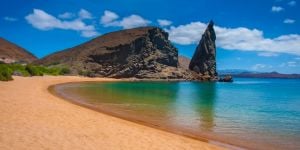 Accommodation on the coast of Ecuador
Accommodation on the coast of EcuadorVisiting Ecuador's coast offers a whole host of exciting adventures, from whale watching to parasailing to just ...
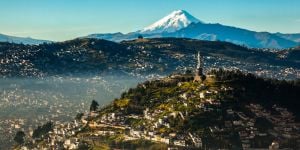 Accommodation in Ecuador
Accommodation in EcuadorA few blatantly commercial websites will tell you that you can waltz out of the airport on arrival in Ecuador and ...
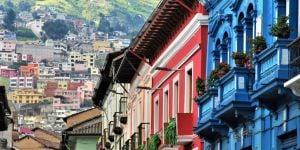 Accommodation in Quito
Accommodation in QuitoThe capital of Ecuador beckons to you, understandably so: with contrasts between old and new creating a culture of ...
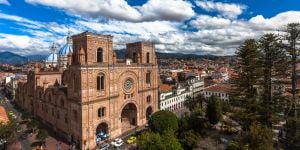 Accommodation in Cuenca
Accommodation in CuencaThe rose-colored lenses through which potential expats have been made to view Cuenca often blur how the real ...
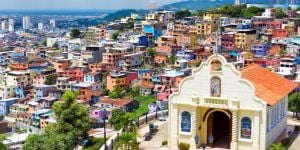 Accommodation in Guayaquil
Accommodation in GuayaquilIt’s safe to say Guayaquil is not about to threaten Cuenca’s title as the sweetest spot to retire to ...
 Food in Ecuador
Food in EcuadorWhat kind of food will you find in restaurants, cafes, and private homes in Ecuador? Many restaurants in Ecuador ...
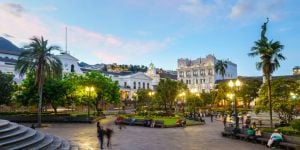 Work in Ecuador
Work in EcuadorEcuador is famous as a retirement haven. But you might not want to wait until retirement age to move there and ...
 Healthcare in Ecuador
Healthcare in EcuadorEcuador, as a fast-developing nation, has laws that are constantly evolving, but one thing is certain: the ongoing ...
Find more topics on the Ecuador forum



